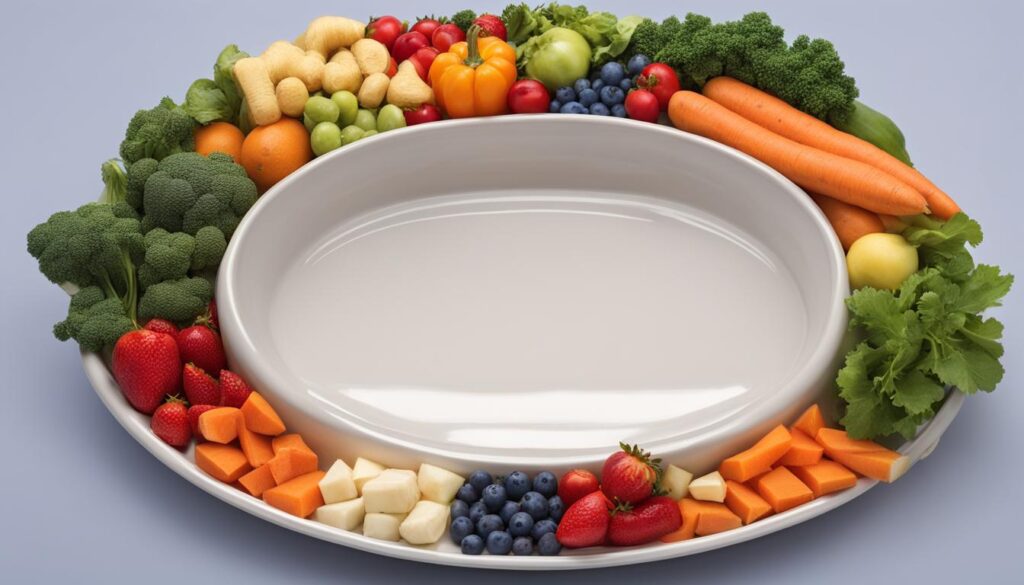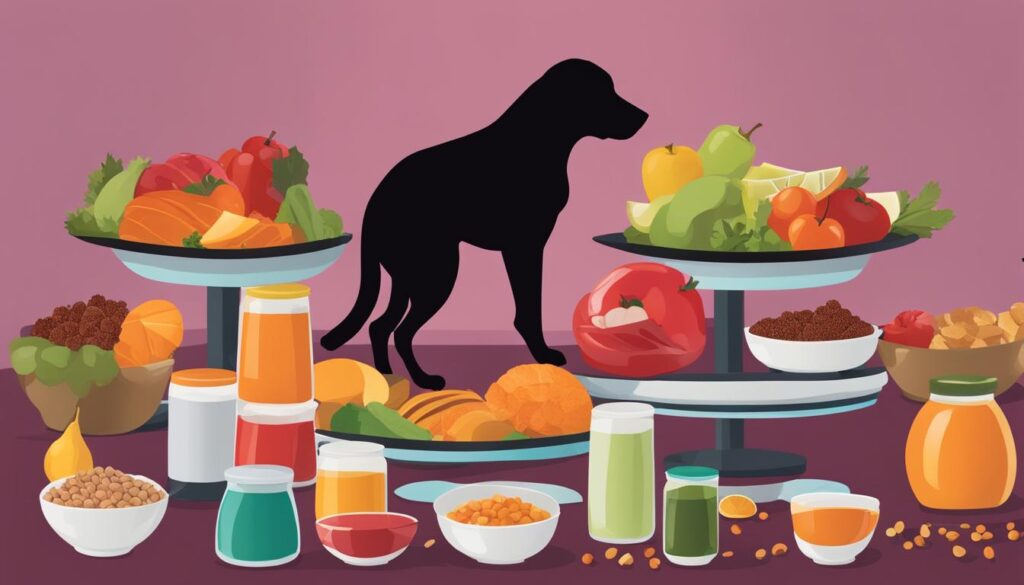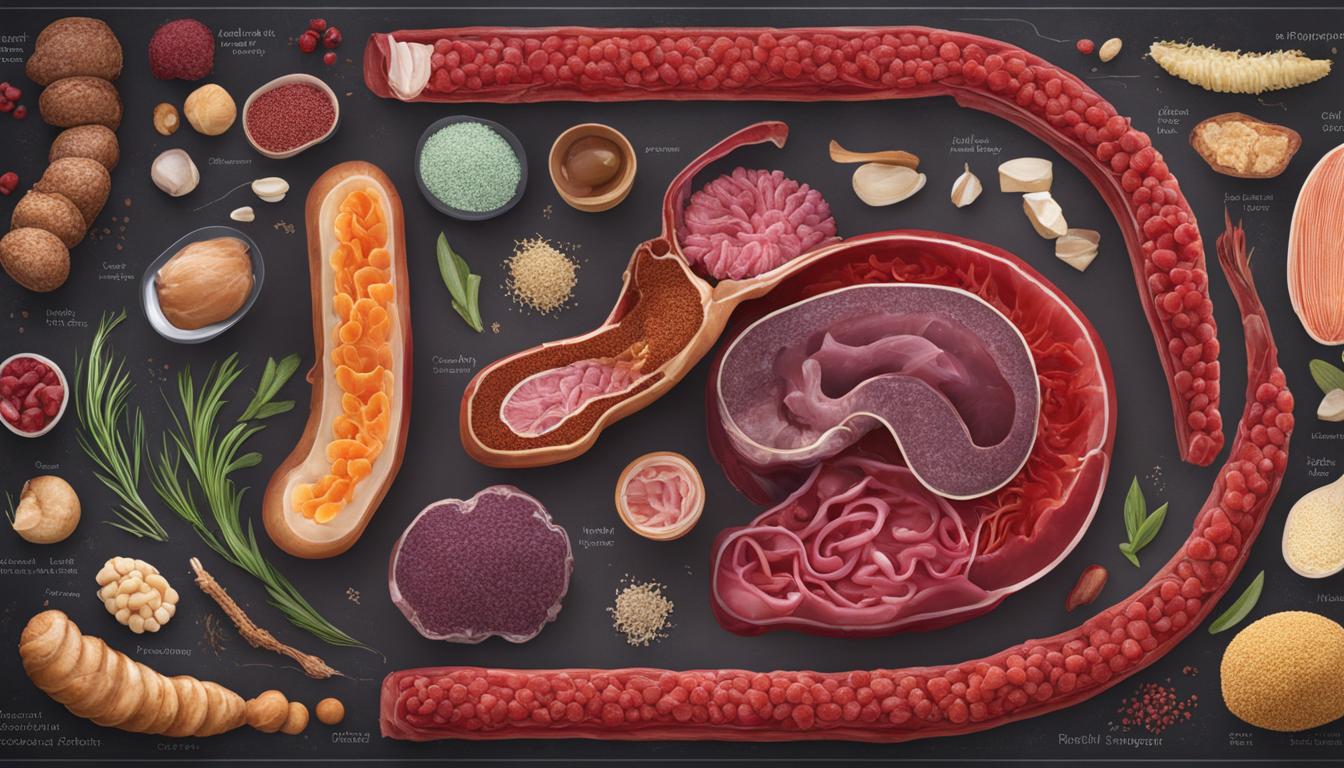When it comes to your furry friend’s well-being, their diet plays a crucial role. Just like us, dogs need the right nutrients to support their digestion and metabolism. In this article, we will explore the importance of dog digestive health, how to improve your canine’s metabolism, and the foods that promote healthy digestion. So, grab a treat for your pup and let’s dig in!
Key Takeaways:
- Dogs require 6 basic nutrients: protein, carbohydrates, fat, vitamins, minerals, and water.
- Proper nutrition is crucial for a dog’s overall health and well-being.
- Choosing the right dog food is essential for supporting healthy digestion and metabolism.
- Feeding guidelines and portions should be determined based on your dog’s individual needs.
- Metabolism and nutritional needs differ between large and small breed dogs.
The Importance of Nutrition for Dogs
Proper nutrition is key to ensuring the overall health and well-being of your furry friend. A well-balanced diet that supports digestion, metabolism, and energy levels is essential. When dogs do not receive adequate nutrition, it can lead to various digestive disorders, causing discomfort and affecting their overall quality of life.
Senior dogs, in particular, may benefit from enhanced metabolism to maintain a healthy weight and prevent age-related health issues. This can be achieved by providing them with a diet that supports their metabolic needs. Additionally, incorporating prebiotics and probiotics into their meals can promote a healthy gut and improve digestion.
Recognizing the signs of poor digestion in dogs is crucial. If your dog frequently experiences vomiting, excessive gas, or bloating, it may indicate an underlying digestive issue. In such cases, consulting with your veterinarian to address the problem and adjust their diet accordingly is essential for their well-being.
| Signs of Poor Digestion in Dogs | Possible Causes |
|---|---|
| Vomiting | Food allergies, dietary indiscretion |
| Excessive gas | Improper digestion, gastrointestinal issues |
| Bloating | Dietary intolerance, gastrointestinal disorders |
Remember, a healthy diet is the foundation of your dog’s well-being. By providing them with nutrition that supports their digestive system and enhances their metabolism, you can ensure they live a happy and healthy life.
Choosing the Right Dog Food
When it comes to your dog’s nutrition, choosing the right food is essential for promoting healthy digestion, preventing digestive disorders, and enhancing metabolism. There are a few key factors to consider when selecting dog food that meets your furry friend’s specific needs.
High-Quality Ingredients for Healthy Digestion
Look for dog food that consists of high-quality, natural ingredients. These foods are more likely to be easily digestible and less likely to trigger digestive disorders. Foods rich in lean protein, whole grains, and fiber can support healthy digestion in dogs.
“Choosing dog food with high-quality ingredients ensures your dog receives the necessary nutrition for optimal health and digestion. Avoid foods that contain artificial additives or fillers, as these can cause digestive upset.”
Enhancing Metabolism in Senior Dogs
For senior dogs, it’s important to choose food that supports healthy metabolism and joint health. As dogs age, their metabolism may slow down, making it easier for them to gain weight. Opting for senior dog food formulated with enhanced metabolism support can help prevent weight gain and promote overall well-being.
Promoting Optimal Digestion with Digestive Enzymes, Prebiotics, and Probiotics
Digestive enzymes, prebiotics, and probiotics are beneficial supplements that can support optimal digestion and metabolic health in dogs. Digestive enzymes help break down food for easier digestion, while prebiotics and probiotics promote a healthy gut flora balance, improving nutrient absorption and digestion.
By considering these factors when choosing dog food, you can provide your furry companion with the optimal nutrition needed for healthy digestion, enhanced metabolism, and overall well-being.

| Digestive Enzymes | Prebiotics | Probiotics | |
|---|---|---|---|
| Function | Help break down food for easier digestion | Promote the growth of beneficial gut bacteria | Restore and maintain a healthy gut flora balance |
| Sources | Natural sources like papaya and pineapple | Foods like chicory root, bananas, and oats | Specific strains of beneficial bacteria |
| Benefits | Improved nutrient absorption | Enhanced digestion and nutrient utilization | Supports a healthy immune system and reduces digestive issues |
Feeding Guidelines and Portions
Proper feeding guidelines and portion control are essential for balancing your dog’s metabolic rate and ensuring their overall digestive health. By following these guidelines, you can help prevent dog digestive disorders and maintain their optimal weight.
It is recommended to feed your dog twice a day, dividing their daily caloric intake into two meals. This helps stabilize their metabolism and prevents overeating. The amount of food your dog needs depends on factors such as their age, weight, and activity level. Consulting with your veterinarian can help determine the appropriate portion size for your dog.
When it comes to signs of poor digestion in dogs, it’s important to monitor their bathroom habits and physical appearance. Frequent bathroom trips, loose stools, or dull fur may indicate an inadequate diet or digestive issues. Adjusting their portion size or consulting with your veterinarian can help address these concerns.
To provide a visual representation, the following table outlines general feeding guidelines based on a dog’s weight:
| Weight Range (lbs) | Recommended Daily Calories |
|---|---|
| 10-20 | 450-900 |
| 30-40 | 900-1200 |
| 50-60 | 1200-1500 |
Remember that these are general guidelines and may need to be adjusted based on your dog’s individual needs. Additionally, it’s important to consider the specific nutritional requirements of your dog’s breed and any additional health conditions they may have.

Metabolism and Nutritional Needs of Large and Small Dogs
When it comes to the metabolism and nutritional needs of dogs, size matters. Large breed dogs have faster metabolisms due to their size and higher energy demands. As a result, their diet should consist of a moderate amount of protein and fat from high-quality sources to support their active lifestyle. On the other hand, small breed dogs have slower base metabolisms but process food faster. This means they require calorie-dense food with quality ingredients to meet their energy needs.
To cater to the different metabolic rates of large and small dogs, it’s important to choose food that is specifically formulated to support their needs. The right balance of nutrients and portion sizes can help maintain a healthy weight and overall well-being. For example, large breed dogs often benefit from joint support, so their food should include ingredients that promote joint health, such as glucosamine and chondroitin. Small breed dogs, on the other hand, may benefit from a smaller kibble size, as it is easier for them to chew and digest.
Here’s a table that outlines the specific metabolism and nutritional needs of large and small dogs:
| Large Breed Dogs | Small Breed Dogs | |
|---|---|---|
| Metabolism | Fast metabolism | Slower base metabolism |
| Protein | Moderate amount from high-quality sources | Calorie-dense food with quality ingredients |
| Fat | Moderate amount from high-quality sources | Calorie-dense food with quality ingredients |
| Portion Size | Larger portion sizes | Smaller portion sizes |
| Joint Health Support | Include ingredients like glucosamine and chondroitin | N/A |
By understanding the unique metabolism and nutritional needs of your dog based on their size, you can make informed choices when it comes to their diet. Remember to consult with your veterinarian to ensure you’re providing the right balance of nutrients and portion sizes for your furry friend. Providing them with the proper nutrition will help them thrive and lead a healthy, active life.

Benefits of Gut Health for Dogs
- Improved digestion and nutrient absorption
- Reduced risk of digestive disorders
- Enhanced immune system
- Protection against cell damage and inflammation
“A healthy gut leads to a healthier and happier dog.”
When choosing dog food, look for options that contain natural ingredients and are specifically formulated to support gut health. Reading the labels and understanding the ingredients can help you make an informed decision. Consult with your veterinarian to determine the best approach to incorporate digestive enzymes, prebiotics, and probiotics into your dog’s diet based on their specific needs and health condition.
Paying attention to your dog’s gut health is essential for their overall nutritional well-being. By promoting a healthy gut microbiota, you can ensure that your dog is getting the most out of their food and enjoying optimal health and vitality.
Conclusion
Proper nutrition is vital for maintaining a healthy dog’s digestion and metabolism. A well-balanced diet, consisting of high-quality ingredients, is key to supporting optimal health and energy levels in your furry companion.
Every dog is unique, and their dietary needs may vary based on factors such as age, size, and activity level. It’s important to choose dog food that not only meets their nutritional requirements but also promotes healthy digestion, enhances their metabolic rate, and supports gut health.
Remember, consulting with your veterinarian is crucial in determining the best nutrition plan for your dog. They can provide personalized guidance and recommend the appropriate diet to ensure your four-legged friend thrives.
FAQ
What are the key aspects of a dog’s diet related to digestion and metabolism?
Dogs require 6 basic nutrients for optimal nutrition and health: protein, carbohydrates, fat, vitamins, minerals, and water. Protein is crucial for growth and metabolism, while carbohydrates provide energy and fiber. Fat is necessary for energy production and taste. Vitamins and minerals play various roles in the body, and water is essential for hydration and bodily functions.
What are the signs of poor digestion in dogs?
Signs of poor digestion in dogs include vomiting, excessive gas, bloating, and frequent bathroom trips. These symptoms may indicate an inadequate diet that needs to be addressed.
How can I choose the right dog food for my pet?
When choosing dog food, it’s important to consider your dog’s specific needs. Look for high-quality, natural ingredients that support healthy digestion. Avoid foods that may trigger digestive disorders or allergies. Consult with your veterinarian for guidance on food that enhances metabolism and supports joint health.
How often should I feed my dog and how much?
Dogs should be fed twice a day to maintain a stable metabolism. The amount of food depends on the dog’s age, weight, and activity level. It’s important to calculate the right caloric intake to prevent overeating and obesity. Consult with your veterinarian to determine the appropriate portion size for your dog.
What are the metabolic needs of large and small dogs?
Large breed dogs have faster metabolisms due to their size and energy demands. They require a moderate amount of protein and fat from high-quality sources. Small breed dogs have slower base metabolisms but process food faster. They need calorie-dense food with quality ingredients to meet their energy needs.
How does gut health play a role in dog nutrition?
A healthy gut microbiota supports digestion and nutrient absorption in dogs. Choosing dog food that promotes gut health is essential for overall well-being. Digestive enzymes, prebiotics, and probiotics can enhance gut health in dogs.
Why is proper nutrition important for a dog’s digestion and metabolism?
Proper nutrition is vital for a dog’s overall health and energy levels. A balanced diet with high-quality ingredients supports optimal digestion and metabolism. Each dog has specific dietary needs based on factors like age, size, and activity level. Consult with your veterinarian to determine the best nutrition plan for your dog.





